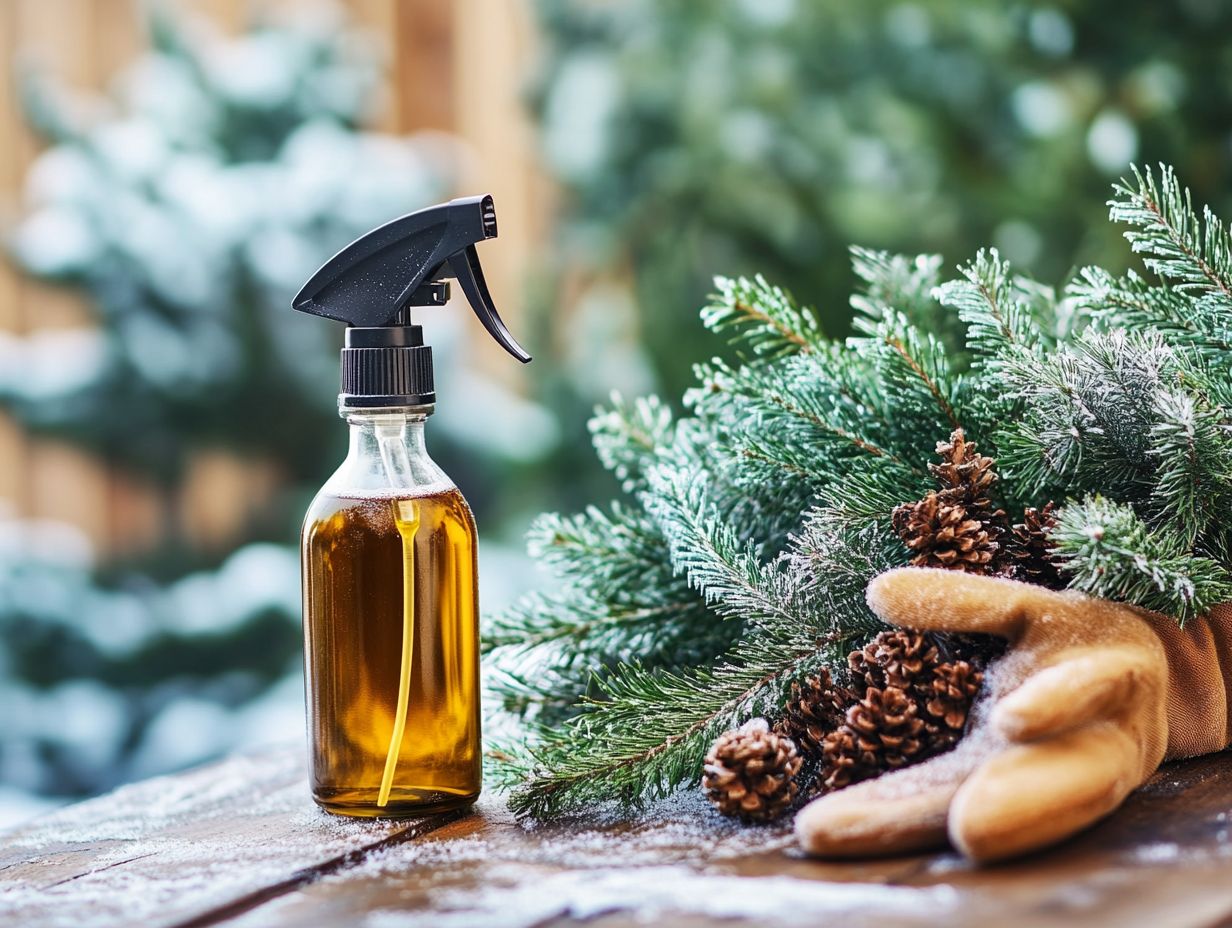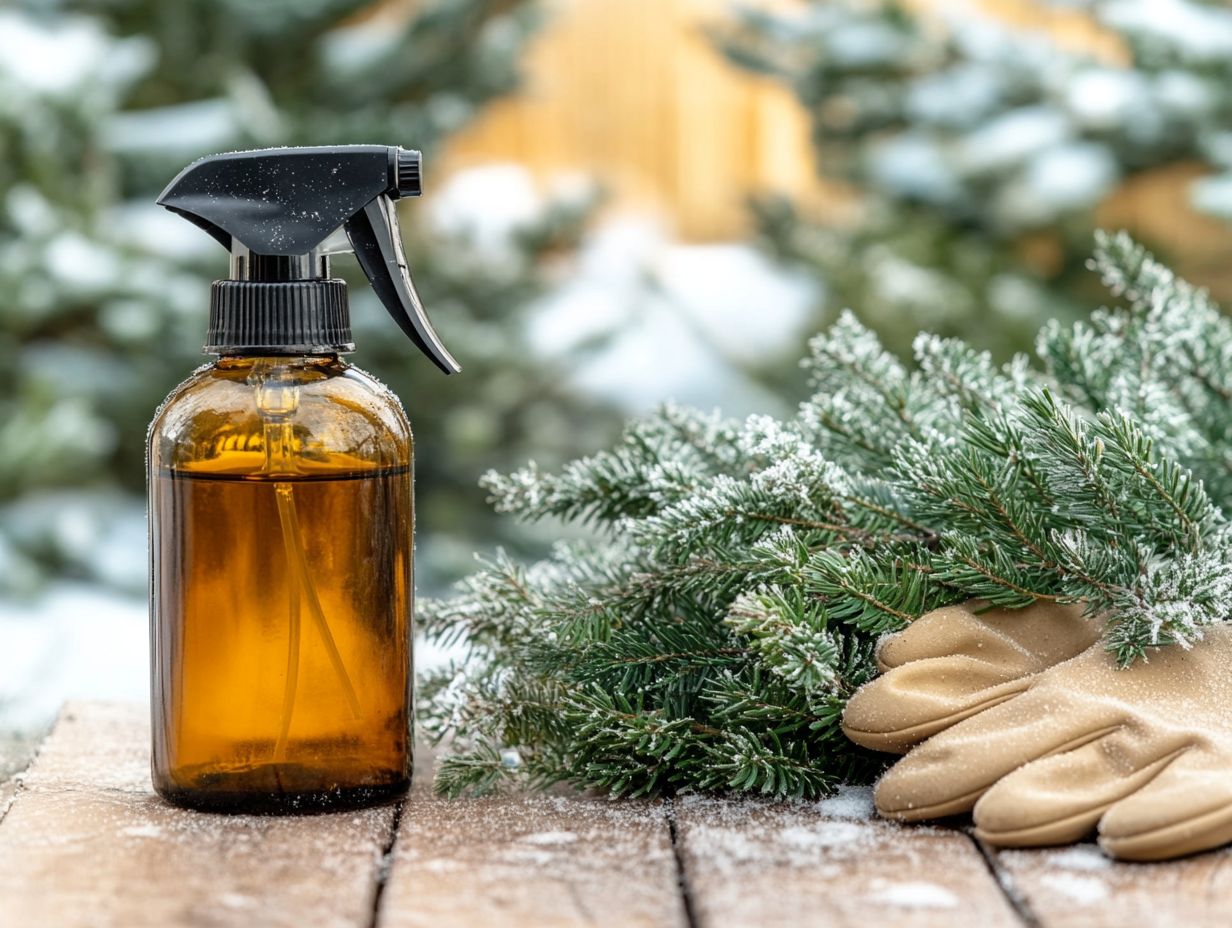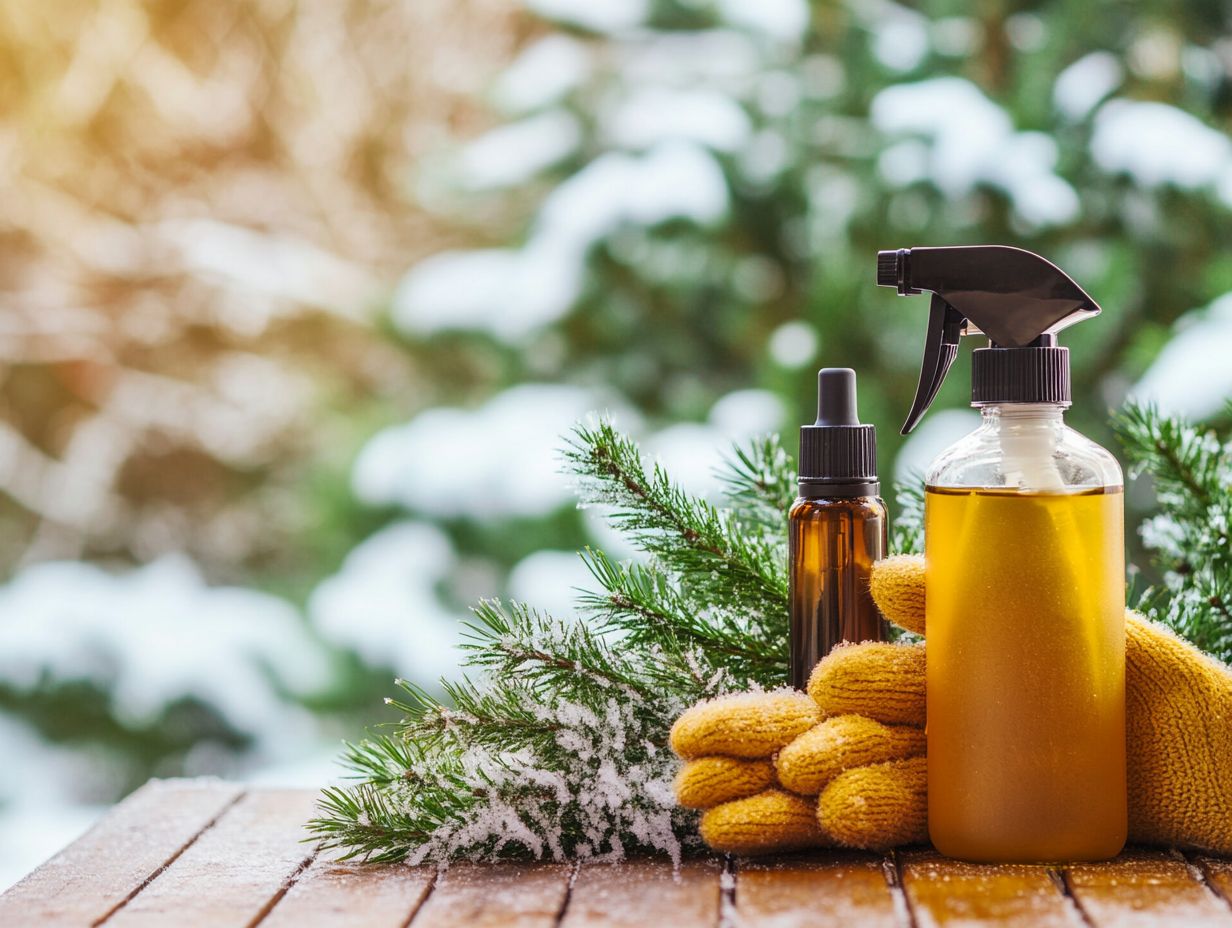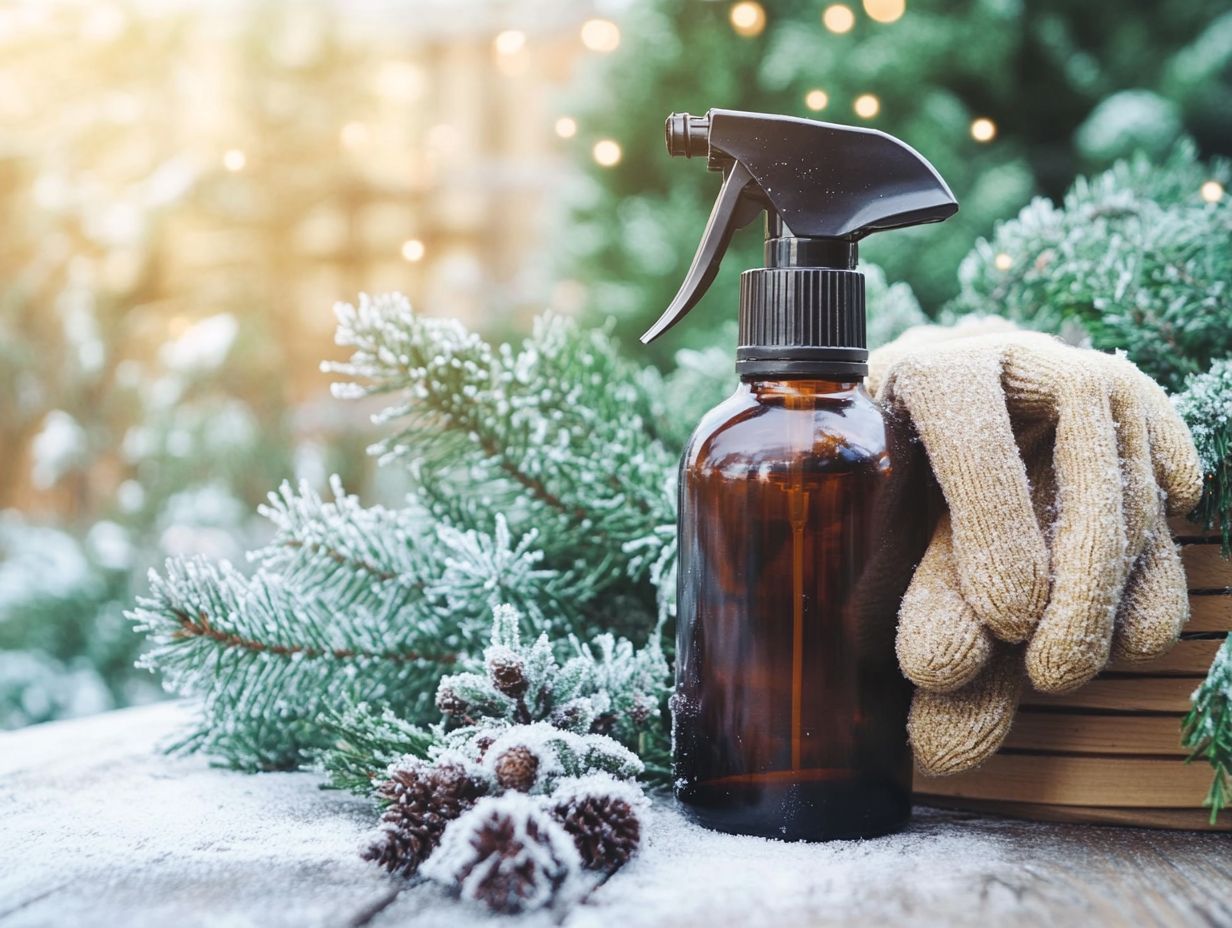Best Organic Pest Control Tools for Winter
As winter envelops your home, you may encounter an unexpected challenge: pests looking for a cozy refuge from the cold.
Fortunately, there are a variety of organic pest control methods available to help you maintain a pest-free environment without resorting to harsh chemicals.
This guide delves into effective, eco-friendly solutions such as essential oils, diatomaceous earth, beneficial insects, and homemade traps. You ll also find insights on common winter pests, along with tailored tips to optimize your approach for the best results.
Prepare to reclaim your space naturally!
Contents
- Key Takeaways:
- 1. Essential Oils
- 2. Diatomaceous Earth
- 3. Neem Oil
- 4. Garlic Spray
- 5. Insecticidal Soap
- 6. Bacillus Thuringiensis
- 7. Beneficial Insects
- 8. Planting Companion Plants
- 9. Physical Barriers
- 10. Homemade Traps
- 11. Vacuuming
- 12. Mulching
- 13. Crop Rotation
- 14. Proper Plant Maintenance
- 15. Professional Pest Control Services
- What Are the Most Common Pests in Winter?
- Frequently Asked Questions
- What are the best organic pest control tools for winter?
- How does neem oil work as an organic pest control tool for winter?
- Is diatomaceous earth safe to use as an organic pest control tool for winter?
- Can garlic spray effectively control pests in the winter?
- Are sticky traps a good option for organic pest control in the winter?
- How often should I use organic pest control tools in the winter?
Key Takeaways:

- Using essential oils, diatomaceous earth, and neem oil can effectively control pests in a natural and safe way during winter, particularly in regions like the Mid-Atlantic and Pacific Northwest.
- Planting companion plants and using physical barriers are simple yet effective methods for preventing pests in the colder months.
- Regular maintenance and professional pest control services can help keep your garden free from pests and ensure a healthy and thriving winter garden.
1. Essential Oils
Essential oils have become a go-to solution for organic pest control, providing a natural way for you to deter common garden pests while enhancing the health of your vegetable gardens. These concentrated plant extracts help you manage pest issues. They are also popular among gardeners, according to the Organic Pest Control Survey conducted by MOTHER EARTH NEWS, highlighting their growing popularity among gardeners across North America.
Among the most effective essential oils for pest control are peppermint, rosemary, and neem oil, each demonstrating impressive results against unwelcome visitors like Japanese beetles and whiteflies. Peppermint oil, in particular, is a formidable foe for these pests, making it a favored choice for gardeners keen on safeguarding their crops.
To apply these oils, simply dilute them with water and a carrier oil before spraying the mixture directly onto the affected plants. Many gardeners report feeling a heightened sense of satisfaction, knowing they re using eco-friendly products that nurture both their gardens and the environment.
2. Diatomaceous Earth
Diatomaceous earth is an exceptional ally in your organic pest management strategy, targeting a variety of garden pests with its unique abrasive properties, all while keeping beneficial insects safe. This natural, non-toxic wonder, made from fossilized algae, works its magic by desiccating pests on contact, causing them to lose moisture and ultimately perish.
You ll find its application refreshingly straightforward; just a light dusting around your plants or mixed with water to create a spray makes it incredibly versatile for different gardening environments. For example, gardeners frequently achieve success in controlling pesky slugs and cucumber beetles two common threats to your crops.
The best part? While it effectively keeps these nuisances at bay, diatomaceous earth remains harmless to beneficial species like ladybugs and bees, ensuring your garden maintains a healthy, balanced ecosystem.
3. Neem Oil
Neem oil is an effective natural pest control option for anyone seeking a solution. It s renowned for its ability to disrupt pest life cycles, all while being gentle on beneficial insects that are vital for a flourishing garden ecosystem.
This remarkable oil effectively targets notorious pests like tomato hornworms and whiteflies by interfering with their feeding and reproductive habits. When you apply it as a spray applied directly to the leaves, neem oil coats the leaves, creating an environment that s far from hospitable for these pests. You can easily implement this method by diluting the oil with water and a mild soap before spraying it onto the affected plants.
What s more, neem oil plays nicely with beneficial insects like ladybugs and lacewings, helping to maintain a healthy balance in your garden. This ensures that harmful pest populations are kept in check while preserving the more desirable species.
Don t wait until pests invade take action today!
4. Garlic Spray
Garlic spray is a natural and cost-effective pest control technique that you can easily adopt. It is renowned for its ability to repel a variety of pests while being gentle on your vegetable garden and beneficial insects.
This homemade remedy taps into the remarkable properties of garlic, making it particularly effective against common nuisances like grasshoppers, aphids, and spider mites.
Preparing the spray is a breeze: simply blend several cloves of garlic with water, strain the mixture, and add a few drops of dish soap to help it stick to your plants.
For optimal results, apply the spray during the cooler parts of the day preferably in the early morning or late afternoon when pests are most active. Regular applications, ideally every 7 to 10 days, will fortify your defenses against infestations, especially after rainfall, which can dilute its effectiveness.
Give garlic spray a try to protect your garden naturally!
5. Insecticidal Soap
Insecticidal soap is a popular choice for your organic pest management needs, especially for tackling soft-bodied pests like aphids and corn earworms.
This soap is made from naturally occurring fats and oils, creating a solution that effectively suffocates unwelcome visitors by disrupting their cell membranes. When applied properly, the soap envelops pests, leading to their elimination without harming your garden’s ecosystem.
For the best results, spray the affected plants thoroughly, paying special attention to the undersides of leaves, where these pesky intruders often hide. Regular applications help prevent future infestations, making insecticidal soap an excellent choice for nurturing a vibrant, healthy garden.
6. Bacillus Thuringiensis
Bacillus thuringiensis (Bt) is a remarkable natural bacterium that serves as a powerful organic pest control solution designed to target caterpillar pests while minimizing impact on beneficial insects and the environment.
You ll find several strains of Bt, like Bt kurstaki and Bt israelensis, each effective against different pests. Application methods for these strains are versatile, including soil drenches, foliar sprays, and integration into genetically modified crops.
For example, Bt kurstaki excels at combating cutworms and hornworms, leading to significant reductions in their populations when applied during their critical developmental stages.
Incorporating Bt into integrated pest management strategies allows you to use different techniques together to control pests. This approach minimizes resistance development and enhances the overall effectiveness of your pest management efforts.
7. Beneficial Insects

Attracting beneficial insects to your garden is a fundamental aspect of organic pest management. These natural predators serve as a sustainable alternative to conventional pest control methods, significantly enhancing the overall health of your vegetable garden.
By creating a habitat that nurtures creatures like bluebirds and beneficial nematodes, you can effectively fortify the resilience of your crops. To entice bluebirds to your yard, consider strategically placing nesting boxes and planting native shrubs that offer natural cover. Concurrently, beneficial nematodes are tiny worms that help control pests in the soil, so incorporating compost and mulching can markedly boost their population.
Over time, nurturing these allies not only helps manage pest populations but also fosters a balanced ecosystem. This approach leads to richer soil health and increased biodiversity, ultimately translating into improved crop yields for your garden.
8. Planting Companion Plants
Companion planting presents a wealth of advantages for organic pest control. Pairing certain plants can effectively deter pests while enhancing overall growth. This method is a gardener’s best friend!
Take marigolds, for example. When you plant them alongside squash, you can significantly cut down on the pesky presence of squash bugs. The delightful scent of the marigolds confuses these intruders, allowing your squash to thrive.
Combining basil with tomatoes not only boosts tomato growth but also draws in pollinators that enrich your garden’s health.
Planting chives near carrots is another clever tactic. It keeps those annoying carrot flies at bay while creating a welcoming habitat for beneficial insects. By understanding these unique plant relationships, you can cultivate a flourishing ecosystem that naturally repels harmful pests and leads to a bountiful harvest.
9. Physical Barriers
Implementing physical barriers is a proactive pest control strategy that protects your vulnerable plants from invasive pests. This safeguards the health of your vegetable garden while promoting organic pest management.
These barriers come in various forms, each tailored to combat specific pests and suit different garden conditions. For instance, using row covers, a lightweight fabric that protects plants from pests, creates a protective layer over your seedlings. This effectively deters pests like flea beetles and root maggots while still allowing sunlight and moisture to nourish them.
Sturdy fencing can be your best friend in keeping larger nuisances, such as deer and rabbits, at bay. Proper placement is key; ensuring those covers are securely anchored and blocking any gaps in the fencing can significantly boost their effectiveness.
By combining these strategies, you can create a robust defense system that contributes to a thriving garden ecosystem.
10. Homemade Traps
Homemade traps offer an innovative and resourceful approach to pest control. They enable you to manage pest populations effectively without relying on harmful chemicals, aligning seamlessly with organic pest management philosophies.
With just a few simple materials, you can craft traps specifically designed to target troublesome pests like slugs and cucumber beetles. For instance, slugs can be lured in with a shallow dish filled with beer, strategically placed at ground level in areas where you often spot them. To keep cucumber beetles at bay, use sticky traps, special cards that capture pests using a sticky adhesive, made from yellow card stock coated in glue.
It’s crucial to check these traps regularly and refresh the attractants to ensure they remain effective. This will help you maintain a thriving garden that’s a true haven for your plants.
11. Vacuuming
Vacuuming may seem like an unconventional choice for pest control, but it s surprisingly effective. This method aligns perfectly with the latest recommendations for maintaining a healthy vegetable garden.
This technique shines when dealing with common garden pests like aphids, spider mites, and whiteflies, which can multiply if left unchecked. To optimize results, consider using a handheld vacuum for targeted precision while minimizing disruption to neighboring plants. Early mornings or late evenings are ideal times for this approach, as pests are less active and more susceptible during these hours.
By thoughtfully integrating vacuuming into your gardening routine, you can dramatically reduce pest populations and ensure your vegetable crops flourish throughout the growing season.
12. Mulching
Mulching serves a dual purpose in your organic pest control strategy. It not only suppresses weed growth but also creates a barrier that limits pest access to your plants. This boosts the effectiveness of your pest control techniques!
Choose organic options like wood chips, straw, and cocoa hulls. They look great and enrich your soil as they decompose while helping to deter unwanted insects. Take straw mulch, for example; its rough texture proves challenging for slugs, making it a top pick for gardens that often face their invasion. On the other hand, wood chips can disrupt grasshopper populations by altering their habitat and breaking their lifecycle.
These natural materials promote beneficial organisms, cultivating a healthier ecosystem that supports your pest management efforts. Ultimately, the layered benefits of using mulch safeguard your plants and enhance overall soil health, creating a more sustainable gardening environment for you.
13. Crop Rotation
Crop rotation is a classic method that interrupts pest cycles and alleviates common garden issues, ensuring your vegetable garden remains healthy and productive.
By alternating different crops in a well-thought-out sequence, you can significantly enhance soil fertility, promote biodiversity, and diminish the chances of pest infestations. Rotate legumes like beans or peas with corn or other heavy feeders. This not only replenishes nitrogen in the soil but also complicates things for pests like corn earworms, making it challenging for them to establish a stable population.
Incorporating brassicas, such as cabbage or kale, can further deter cutworms due to their unique growth patterns and root structures. This thoughtful approach fosters a resilient ecosystem, allowing your garden to flourish vibrantly while reducing dependence on chemical treatments.
14. Proper Plant Maintenance

Keeping your plants healthy is crucial for preventing garden pest issues and effectively implementing organic pest control strategies. This ensures your plants not only survive but thrive!
Routine inspections catch early signs of trouble, preventing infestations from getting out of control. Tailoring consistent watering schedules to your plants’ specific needs helps maintain soil health and prevents stress that could attract unwelcome pests.
Thoughtful pruning enhances air circulation and sunlight penetration while removing any dead or diseased foliage that pests might use as breeding grounds. Together, these maintenance techniques create a flourishing ecosystem where beneficial insects can thrive, ultimately reducing your reliance on chemical solutions and fostering a more sustainable garden environment.
15. Professional Pest Control Services
If you’re dealing with stubborn pests, professional pest control services can help! They offer tailored solutions that align perfectly with organic pest management principles while effectively tackling pest problems.
These experts conduct thorough inspections to assess your specific pest challenges, identifying not just the visible signs of infestation but also diving into the underlying causes. They use eco-friendly methods like natural repellents and smart pest strategies to create a healthier environment for your plants, beneficial insects, and the surrounding ecosystem.
Choosing such services means you re opting for a strategy that efficiently targets pests while supporting sustainable gardening practices. This helps you maintain a vibrant garden without relying on harsh chemicals. Embracing this balanced approach is essential for long-term pest management and overall environmental wellbeing.
What Are the Most Common Pests in Winter?
You must know the most common winter pests to protect your plants! Winter introduces distinctive challenges for you as a gardener, bringing forth specific pests that can threaten your plants and vegetables. Familiarizing yourself with these winter pests and learning how to manage them effectively is crucial.
As temperatures drop, pesky insects such as aphids, spider mites, and whiteflies may seek refuge in your greenhouses or on indoor plants. They continue their life cycles despite the chilly conditions. By understanding their behaviors, especially their tendency to seek warmth and moisture, you can implement effective organic pest control strategies. Additionally, utilizing essential tools for protecting winter crops can help you manage these pests. Techniques like introducing beneficial insects or applying neem oil can significantly disrupt their infestations.
Preparation in the fall is essential. Clearing debris, mulching, and ensuring proper air circulation can help deter these pests from spending the winter in your garden. By understanding the best timing for pest control in winter, you can effectively reduce winter pest populations and protect your precious crops.
How Do These Pest Control Tools Work?
Understanding how various pest control tools work is essential for you as a gardener seeking effective control methods. This knowledge helps you pick the best strategies for your pest problems.
By exploring the mechanisms behind essential oils, diatomaceous earth, and beneficial insects, you gain a deeper appreciation for the ecological balance these organic solutions maintain. Essential oils, derived from plants, release aromatic compounds that disrupt the sensory navigation paths of many pests. This effectively repels them while keeping beneficial insects unharmed.
Diatomaceous earth, made from fossilized algae, serves as a physical barrier. Its sharp, abrasive particles can damage the exoskeletons of crawling insects, leading to dehydration and eventual elimination. Meanwhile, by incorporating beneficial insects like ladybugs and lacewings, you introduce natural predators into your ecosystem, fostering a sustainable cycle of pest control that works in harmony with the environment.
Are There Any Risks Associated with Using Organic Pest Control?
While organic pest control methods are generally safer for the environment, it’s important for you to be aware of the associated risks. Informed pest control advice is crucial.
Misapplying natural products can inadvertently cause harm, disrupting beneficial insect populations that are essential for maintaining ecological balance. Some organic solutions may also raise environmental concerns if they wash into waterways, impacting aquatic life.
To mitigate these risks, it s essential for you to follow application guidelines closely. Select products that are safe for non-target species and consider combined methods for managing pests that prioritize monitoring and preventive measures.
By taking these precautions, you can enjoy the benefits of organic pest control while keeping your plants safe!
How Can a Homeowner Determine the Best Pest Control Method for Their Situation?
Determining the most effective pest control method for your specific situation involves evaluating a range of factors, including the types of pests you re dealing with, the severity of the infestation, and the principles of organic pest management.
Start by conducting a thorough inspection of your property. Search for signs of infestation like droppings, gnaw marks, or nests. Identifying the specific pests at play allows you to better understand their behavior and the potential risks they present.
After this assessment, it s crucial to explore various organic pest control options that align with eco-friendly practices. Consider using diatomaceous earth, neem oil, or even attracting beneficial insects to manage the issue effectively.
This structured approach ensures you have a comprehensive strategy for pest management while protecting both the environment and your home. Start inspecting your garden today to keep those pests at bay!
What Are Some Additional Tips for Effective Pest Control in Winter?
Effective winter pest control hinges on specific strategies designed to tackle the unique challenges that cold weather presents. It’s essential for you as a gardener to implement essential cold-weather pest management tools and tailored pest control tips.
During the winter months, pests often seek refuge in dormant plants, garden debris, or poorly insulated sheds. This can lead to potential infestations. To combat this, prioritize preventive measures by preventing indoor pests during winter: thoroughly clean up dead leaves and plant material to eliminate those enticing breeding grounds.
Maintaining your plants is crucial. Cutting back perennials and applying mulch to vulnerable plants will create a sturdy barrier against pests.
Regular monitoring techniques are essential. Conduct weekly checks for signs of unwelcome visitors or damage to help keep your garden pest-free, ensuring healthy plant growth even in the coldest of seasons.
Frequently Asked Questions

What are the best organic pest control tools for winter?
Some of the best organic pest control tools for winter include neem oil, diatomaceous earth, garlic spray, and eco-friendly pesticides like sticky traps.
How does neem oil work as an organic pest control tool for winter?
Neem oil, a natural pesticide derived from the neem tree, is effective against pests. It works by disrupting the hormonal balance of pests, making it difficult for them to reproduce and causing them to eventually die off.
Is diatomaceous earth safe to use as an organic pest control tool for winter?
Yes, diatomaceous earth is safe to use as an organic pest control tool for winter. It is a powder made from fossilized algae, and it works by dehydrating and killing pests. For more effective strategies, consider following the best practices for pest monitoring in winter.
Can garlic spray effectively control pests in the winter?
Yes, garlic spray is a great organic pest control tool for winter. The strong smell of garlic repels pests and can be used on plants to protect them. Additionally, following the best practices for winter pest control can enhance your efforts.
Are sticky traps a good option for organic pest control in the winter?
Yes, sticky traps are an effective and non-toxic option for organic pest control in the winter. For more detailed strategies, consider protecting your garden from winter pests. They work by trapping pests on a sticky surface, preventing them from causing damage to plants.
How often should I use organic pest control tools in the winter?
The frequency of using organic pest control tools in the winter depends on the severity of the pest infestation. Keep a close eye on your garden and use these tools whenever you notice pests, following the instructions on the product label. For more tips, check out how to use natural pest control in winter.






